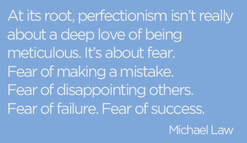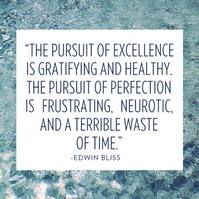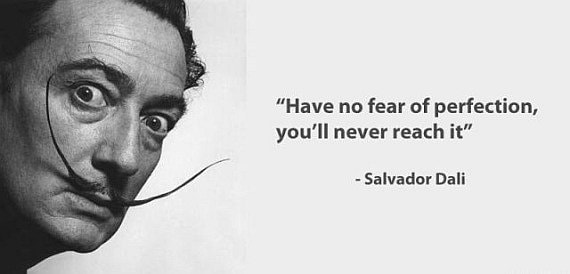
If the answer is "yes," then not only may you tend towards perfectionism, but you're at increased risk of stress and anxiety, and less likely to feel content and happy. Your home life, social life, even work life all become a gruelling feat as you struggle to make everything you do "perfect." That's also the case for those around you, who have to decide to allow themselves to get pulled into the vortex, or to stand well clear.
The constant message from society is that one must endlessly strive for perfection, that we can always be better, our clothes whiter, our pasta perfect. Absent are messages that remind us to relax, that working towards being satisfied with what we have is a worthwhile goal. (Who finds that statement hard to accept?)
In fact, those constantly striving for perfection are at greater risk of stress and anxiety - things that lead back into perfectionism. The result can be a spiral where the harder you work at something, the worse you seem to be at achieving it.
- You can't stop thinking about a mistake you've made
- You're very competitive and hate to lose
- You like to do things perfectly or not at all
- You won't ask for help - that's weak
- You find fault in others and make a point to correct them
- You think untidy people are lazy
- You're very self-conscious about making mistakes in front of others
Dr. Miriam Adderholdt notes in her 1992 book Perfectionism: What's Bad About Being Too Good?:
There's a difference between excellence and perfection. Excellence involves enjoying what you're doing, feeling good about what you've learned, and developing confidence. Perfection involves feeling bad about a 98 and always finding mistakes, no matter how well you're doing.

Here are some tips to help you get started.
- Accept that you are human, with a limited set of skills and abilities, and are therefore unable to achieve perfection. It is, in fact, impossible.
- List the positives and negatives of perfectionism - the costs and the benefits. Which side do you prefer? Now delete those things on the perfectionist side that can remain if you simply strive for excellence. What does the equation look like now?
- Bring awareness to your thinking around tasks. Are you actually working to make yourself happy, or to protect yourself from doubt or criticism? Note the negative basis of your self-talk (no doubt containing a "should" somewhere) and instead cultivate thinking on what you prefer to do or to be in a given situation.
- Be realistic. 'nuf said.
- Practise taking risks in situations where you are likely to fall short. Know you will, and use that to practise sitting with that feeling, and taking any criticism as relevant only in that it helps you to learn.
Becoming the person you prefer to be is hard work. It takes courage, honesty, and requires that you trust yourself to know how you want to live. It's also the common work of psychotherapy, as you learn to identify things you want to change, and get the objective and skilled assistance to achieve it.


 RSS Feed
RSS Feed